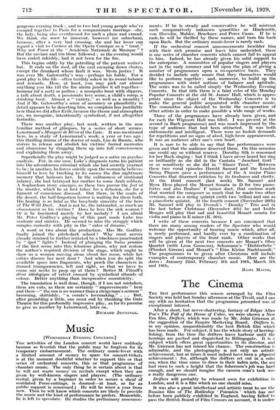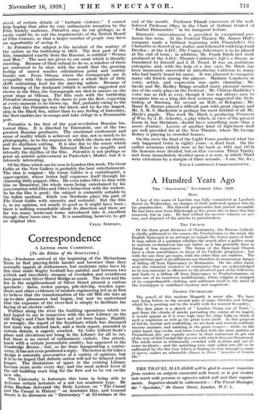The Cinema
THE first performance this season arranged by the Film Society was held last Sunday afternoon at the Tivoli, and I can say with no hesitation that the programme presented was of exceptional interest.
After a short, but nerve-shattering, fantasy of Edgar Allan Poe's The Fall of the House of Usher, we were shown a New Era film, Drifters, which was made by Mr. John -Grierson at the suggestion of the Empire Marketing Board. Drifters is, in my opinion, unquestionably the best British film which has been made. For subject, it has the whole story of herring- fishing, from the time the drifters leave harbour until the herrings are packed and dispatched to Billingsgate. It is a subject which offers great opportunities to its director, and Mr. Grierson has not missed his chance. The construction is admirable, and the photography -is not only an artistic achievement, but at times it must indeed have been a physical achievement ; for, although the drifters set out in a calm sea, when the time came to draw in their laden nets, the sea had risen to such a height that the fishermen's job was hard enough, and we should- imagine the camera man's task was a really dangerous one.
Drifters will probably be released soon for exhibition in London, and it is a film which no one should miss.
It was also a great intellectual and artistic treat to see the Russian film of The Battleship ' Potemkin' which has not before been publicly exhibited in England;- having failed-to pass the British Board of Film Censors on account, it is under- stood, of certain details of " barbaric violence." I cannot help hoping that after its very enthusiastic reception by the. Film Society audience, Potemkin may be cut perhaps, as it easily could be, to suit the requirements of the British Board of Film Censors, so that a larger number of people may have an opportunity of seeing it.
In Potemkin the subject is the incident of the mutiny of the sailors on the battleship in 1905. The first part of the film, translated exactly from the Russian, is entitled " Worms and Men." The men are given to eat meat which is literally crawling. Because of their refusal to do so, a number of them are sentenced to be shot, with the result that the growing feeling of unrest reaches culmination point and mutiny breaks out. From Odessa, where the townspeople are in sympathy with the mutineers, comes a whole fleet of little skiffs containing food for the starving sailors. Because of the burning of the dockyard (which is neither suggested nor shown in the film), the townspeople are shot in masses on the great steps at Odessa. The film ends with the battleship Potemkin steaming up in the dawn to join the fleet, expecting at every moment to be blown up. But, probably owing to the fact that the Potemkin was the latest, and by far the largest, ship in the Black Sea, rather than to any feeling of fraternity, the fleet enables her to escape and take refuge in a Roumanian port.
Potemkin is the first of the post-revolution Russian his- torical films. It is directed by Eisenstein, one of the two greatest Russian producers. The emotional excitement and sense of reality which is achieved are due, not so much to its photography, as to the sequence in which the shots are shown, and its rhythmic cutting. It is also due to the music which has been arranged by Mr. Edmond Meisel to amplify and intensify the rhythm of the film. Potemkin is not perhaps so great an artistic achievement as Pudovkin's Mother, but it is intensely interesting.
Of the films which can be seen in London this week, The Great Gabbo at the New Gallery is probably the best entertainment. The idea is original : the Great Gabbo is a ventriloquist, a super-egotist, whose better half expresses itself through his charming little puppet, Otto. He even takes Otto to dine with ,him on Broadway, the whole room being entertained by his ponversation with Otto and Otto's behaviour with the waiters. $o far the film is good : the subject is eminently suitable to the talkie medium. Erich von Stroheim plays the part of The Great Gabbo with sincerity and restraint. But the film is, in my opinion, not nearly so good as it might have been ; there is nothing remarkable about its direction and there are far too many irrelevant turns introduced into it, excellent though these turns may be. It is something, however, to get an original idea.
CELIA SIMPSON.









































 Previous page
Previous page